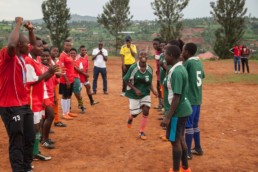FOOTBALL FOR PEACE
“Football moves the world”

We use sport and football to bring together young people and promote community reconciliation in the UK and Rwanda.
Our training sessions and matches use the power of football to encourage team work, develop conflict resolution skills and fight prejudice, intolerance and hatred in our communities.
We believe that football moves the world and we are determined to make it the cornerstone of young people’s feeling of social responsibility.
HOW DOES FOOTBALL ENCOURAGE SOCIAL CHANGE?
Football encourages social change and peacebuilding in a range of ways…
COLLABORATION AND TRUST
After conflict, trust is broken between communities. For example, in Rwanda in 1994 neighbours killed neighbours. In other communities there may be long histories of different forms of conflict, racism, rivalry or other issues.
It takes time and collaboration for trust to be rebuilt. Playing football offers the opportunity to bring people from different groups together into the same team working for the same purpose – to score goals! Collaboration is essential because one player cannot win the game alone. Football requires players to trust that their teammates will act in the best interest of the whole team: passing when necessary, playing defensive roles and so on.
UNITY AND PARTICIPATION
Football is unifying because it brings together diverse people through a shared love of sport.
In addition to players needing to trust each other on the pitch, coming together to practice and play matches on a regular basis increases contact between different groups, encouraging friendship and reducing prejudice.
Working together towards a shared goal is a helpful way to move beyond a divided history.
SELF-DISCIPLINE AND MOTIVATION
Evidence shows that physical activity is beneficial for both physical and mental health.
Football reaches young people who might find it difficult to respond in conventional educational settings. Physical activity outdoors helps participants to learn about how to stretch their own limits for the sake of a shared goal.
Through playing football regularly young people see for themselves that putting effort into training leads to results on the pitch. Motivation and self-discipline may then be taken into other areas of their lives.
TOOLS TO EXPLORE DISADVANTAGE
Traditionally women and girls have not been very involved in football in Rwanda. We are hoping to change this through education and tailored coaching.
Sport training sessions offer opportunities to facilitate discussion about how different people
Experience disadvantages. For example, by playing games where certain members of the team are not allowed to run, we can talk about what it means for different people in society to be held back.
A NEW WAY TO REMEMBER
The love of sport opens up new ways for people to connect with the past.
During Ishami Foundation training sessions we share many inspiring stories about how sportsmen and women rescued colleagues during the 1994 genocide against the Tutsi and other conflicts. These inspiring stories show that unity and friendship can be stronger than political division.
By experiencing the connecting power of sport for themselves, participants are able to think about the past in new ways.
A NEW WAY TO BUILD
Sport in general and football in particular have been vital for bringing Rwandans together to build a new nation after genocide.
Eric Murangwa Eugene remembers:
“The first ever public gathering after the Genocide was a football match between my former football club Rayon Sports and its main rival Kiyovu Sports that took place just weeks after the killing had ended. This game brought back a sense of life: for the first time since the genocide, Rwandans gathered to celebrate the return of peace and manifested hope for the future.”
RESEARCH IN THIS FIELD
For more about the latest scientific research in this field please see our the Football 4 Peace pages on the University of Brighton website.
